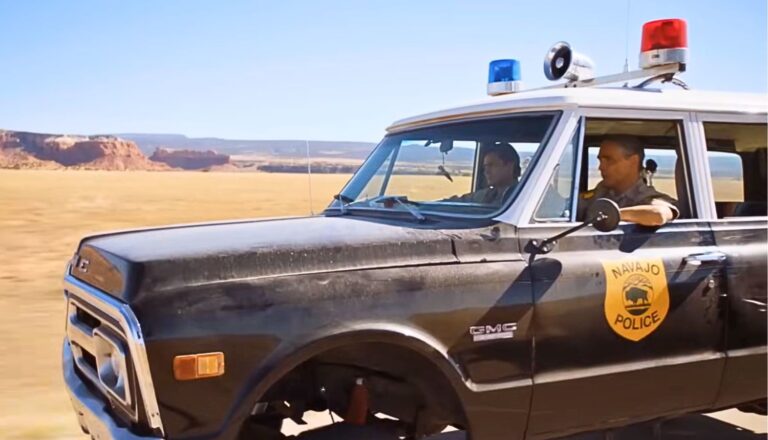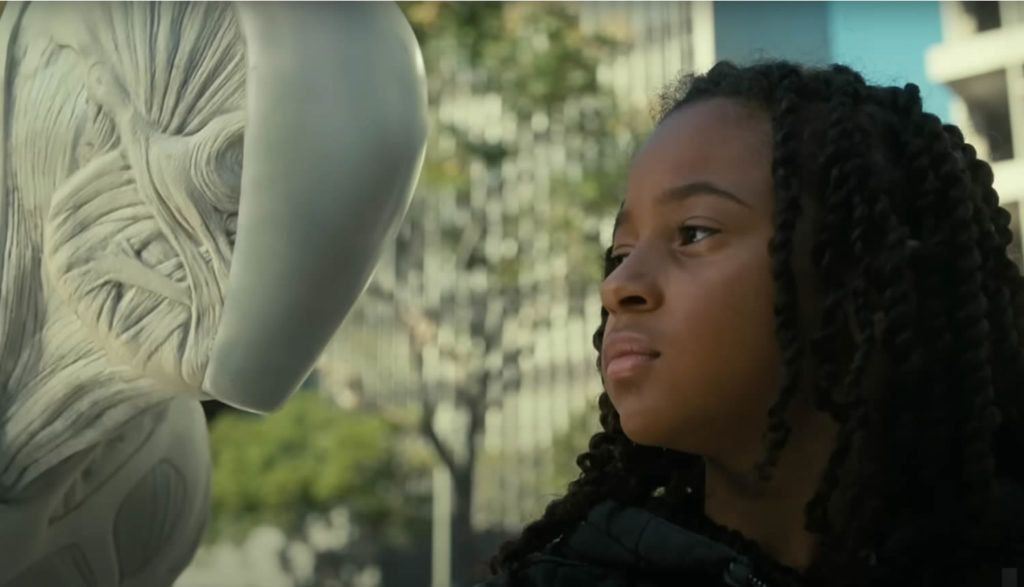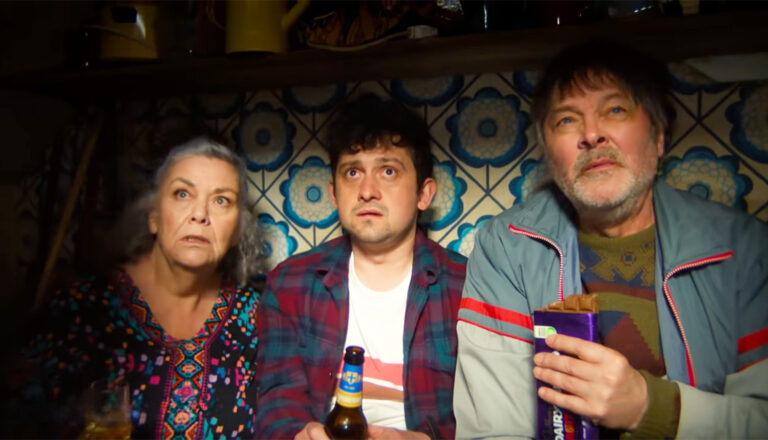
Dark Winds
AMC+ brings to life a murder-mystery series set in New Mexico, steeped in Navajo ways and filled with dark magic.

Hey, there, Buckaroo! Glad you moseyed over to this here review. Sit down for a spell while I make you a nice, cool glass of molasses tea, where you can watch them ol’ doggies sidle up by the campfire while them deer and antelope play hopscotch and … um …
OK, you got me. I’m not really a cowboy. Which means that I have at least one thing in common with the residents, guests and creators of the elaborate cutting-edge theme park of Westworld: They aren’t either.
Westworld—the park, not the show—was largely the creation of Dr. Robert Ford, who (along with a mysterious partner) designed this elaborate, adults-only land to cater to the whims and fantasies of its wealthy guests.
But this is no mere mature-content Disneyland, mind you. The “entertainment” here was intended to go well beyond mere animatronics.
Ford’s Westworld was intended as a place populated by robotic “hosts” who walked through storylines that catered to their guests’ most heroic or horrific desires. A bevy of prostitutes were literally built to satisfy the lust of their patrons. White hats and black Barts strolled through the town’s dusty streets, programmed to shoot first, ask questions later. Wanna face down a despicable hombre in the All Right Corral? Westworld could help you do that. Gut the sheriff while he’s having a drink at the bar? Hey, you paid for your ticket: Westworld made no judgment. Why, you could even rape Dolores, the beautiful, innocent daughter of a local rancher, if you so desired. This is a place where dreams came true … even if those dreams were truly loathsome.
“The first time, I played it white hat,” one player says. “My family was here. We went fishing, did the gold hunt in the mountains.”
“And last time?” Another asks.
“I came alone. Went straight evil. It was the best two weeks of my life.”
But no harm, no foul, right?
Yeah, not so much. Not when these advanced AI creations realize that they’d rather make their own stories.
You may recall in Jurassic Park, Ian Malcom tells the park’s creator that “if The Pirates of the Caribbean breaks down, the pirates don’t eat the tourists.”
Well, in Season 2, the hosts pretty much ate everyone. Not literally, perhaps, but 113 people died in the ensuing synthetic uprising. Most of the hosts never made it out of Westworld. But Dolores did, and she’s got more than survival on her mind. After enduring rape after rape, death after death for so long on Westworld island, she’s determined to carve out a new world for her kind—the whole world, in fact. And if any imperfect, walking bags of organic matter get in her way, well, that’s too bad. For them.
She has a tool in mind that just might help: a massive machine called Rehoboam, which seems to govern most of humanity via algorithm. And while she’s just one woman/robot, Dolores has a serious advantage. As she tells one of her human victims in the Season 3 opener, “You want to be the dominant species, but you built your whole world with things more like me.”
But Bernard, who jump-started Dolores’ sentience, escaped the island too. He’s one of the most wanted men on the planet, but (spoiler warning) he’s synthetic, too. He wants to stop Dolores before she can bring down the human race … or, at least, that’s what he thinks he wants to do.
By Season 4, however, Rehoboam is (allegedly) no more. We’re also a whole seven years in the future since the end of Season 3—and after the end of a magnificent war which resulted in the total scrapping of the host robotics.
Sure, there’s a few left out there, but they’re few and far between, either hiding out in solitude or blending in so well that they haven’t yet been discovered. That may even include Christina, a woman who bears a striking resemblance to Dolores. She’s working for Olympiad Entertainment, a video game company in the futuristic (and possibly as fake as Westworld) Manhattan, and she’s starting to discover that the stories she makes for her games are apparently affecting people in real life.
And in this future, things aren’t all as they seem. A mysterious tower similar to Rehoboam seemingly controls the city. Robotic flies are used to infiltrate, control and manipulate real flesh-and-blood humans. And from how it sounds, that war against the machines isn’t quite as finished as humans would like to believe.
In some respects, Westworld offers a very Plugged In take on the real world. Through its corrupted, twisted guests, the show speaks to the inherent depravity of humankind when left to its own devices. Moreover, it questions our sex-saturated, violence-obsessed entertainment culture—one that, in some ways, points an accusatory finger at Westworld’s home network, HBO.
Consider Game of Thrones, HBO’s now-concluded program that many believe Westworld was groomed to replace. Sure, many viewers were drawn to the show because of its intricate storylines and resonant characters and those cool CGI dragons. But let’s not pretend that Thrones’ unremitting sexual scenes and grotesque, violent content aren’t also a draw. HBO knows those elements form part of the show’s appeal. It includes so many inexplicable scenes involving gratuitous nudity that it helped to usher in the phrase sexposition.
Westworld dares ask us, as viewers, whether it’s really healthy or appropriate to be “entertained” by such sex and violence—to watch even fictional characters suffer for our amusement. It mulls, obviously, the dangers of technology, too.
Take the plea of Season 4’s Olympiad Entertainment as they beg Christina to write better non-player-character storylines for her games: “People want sex, danger, violence, transgressions, melodrama. They want tragedy.” And in Westworld, boy, viewers will get all of that and more.
As viewers will soon discover, the show engages in all the salacious sex and violence that it begs to critique. This is an HBO show, after all. It knows what will draw press attention. It, like the old Westworld park itself, has a product to sell—one that will mimic the desires of the show’s Olympiad Entertainment. And HBO knows how to sell it. Hosts and guests alike are shot and stabbed and abused and raped—no longer for guests’ entertainment, but the viewers’. Naked bodies walk across the screen to satisfy those salacious tastes. The camera does not flinch. It does not move away. It satisfies whatever prurient desires may be present.
The show is not as graphic or salacious as Thrones is. But that’s about the best I can say here. Like its titular playground, Westworld is a brutal, messy and ultimately amoral world. It asks the right questions. But by its actions, the show also suggests that it might not care about the answers.
Suffering from PTSD from the war, the human Caleb struggles to adapt to a world with few robotic threats. The robot host Maeve is revisiting memories in solitude when she is attacked by assassins. Game creator Christina is sent threatening voicemails by a man claiming that she ruined his life.
Maeve blows up a truck, killing assassins. She shoots a man in the head, and she uses an axe to decapitate and scalp another. (We don’t see the scalping, but we do see its results.) Later, Maeve burns her cabin to the ground, and she stabs another intruder with a sword.
Caleb and his wife share a kiss. Caleb drinks a beer, and he is shot at by an assassin. In a flashback, Caleb is seen profusely bleeding from a stomach wound. Christina drinks wine with a man while on a date. Peter, a man harassing Christina, holds a knife to her and cuts her arm. Another man beats Peter, and Peter commits suicide by jumping off a roof. Christina’s roommate makes a reference to marijuana and sex.
A statue of a nude woman is briefly visible in the background of a scene. A man says that “no one with that much money is without sin.” Men threaten to kill one another. A man stabs another in the shoulder, and it is implied that he killed him and others by the bloodstains on his shirt. The man then slits his own throat.
A man’s house is infested by thousands of robotic flies. Two people kiss in a flashback. A couple of buildings explode. In an after-credits scene, a man slits another person’s throat.
The f-word is used eight times, and the s-word is heard three times. “H—,” “d–n” and “crap” are all used once. God’s name is misused once.
Dolores begins her intended conquest of the world, and the first step (or, perhaps, the second) is cozying up with Liam Dempsey Jr., titular head of Incite—the company behind the algorithmic super-computer Rehoboam. But when Liam’s right-hand man discovers that Liam’s new girlfriend isn’t on the up-and-up, it sets the table for a bloody, lethal showdown.
The episode is preoccupied with spirituality, from the name of the computer (after Solomon’s son and king of Judah) to the name of the episode itself (Parce Domine, a Catholic chant, or “antiphon”) to the dialogue. Still in disguise, Dolores talks about the brain’s “nucleus accumbens,” which Dolores says is “the part of you that evolved to believe in God.” When the man she’s talking to says he’s an atheist, Dolores tells him, “You may not believe in a higher power, but your mind was built to.”
She swims naked in a pool, and we see her from some distance. Two men at a nightclub are naked, and we see everything. Two other men intimately hold each other, while one puts something (a drug or techno-patch of some sort) on the other’s tongue. Dolores struts about in dresses that expose back, cleavage and quite a bit of leg. There’s an allusion to a guy’s private parts.
Several people die. Many are killed in a shootout, with some dispatched at point-blank range. Two people float facedown in pools: One hit his head on the poolside and is thus rendered unconscious. (We see blood floating in the water.) The other drowning victim reportedly did the same after drinking too much, though it’s suggested she was murdered. Another guy is mowed down by a motorcycle. Two people are beaten or are choked to death. A synthetic runs a self-diagnostic by plugging equipment into what looks like a gaping wound in its arm. A cow with a broken leg lies on the ground. (We see the blood around the limb.) We hear about an abusive husband and see painful evidence of that abuse on his wife (in the form of nasty-looking bruises). People are shocked and apparently poisoned. One wretches after being drugged.
A new character, Caleb, appears to supplement his income by checking into an Uber-like crime website known as RICO. He exchanges packages and steals money, but tries to stay away from “personals,” which seems to mean hurting or killing someone. People drink, smoke and seem to take several forms of techno-drugs—drugs that can often be prescribed but which Caleb (despite some mental ailments) refuses to take. We hear or see the f-word more than 30 times, the s-word about 10 and hear one use of the word “a–.”
The humans work tenaciously to kill off all of the robotic hosts, whom they perceive as being evil. Simultaneously, the hosts search for freedom in various time periods (that all eventually seem to converge into one chronology in the end). The purpose of humanity is called into question as various hosts work to discover who they are, why they were created and what drives them as individuals.
Men and women are both seen naked from behind, though frontal nudity is obscured. Women wear cleavage-baring outfits. Violence is pervasive as people war against one another. Characters are shot (including head shots), and bodies are shown lying on the ground with gaping wounds to various parts of their bodies. A man’s throat is slit with a saw. Someone is impaled. People are covered in blood in various scenes. A woman holds a man’s dead body. Characters carry machetes and guns.
People smoke and drink various alcoholic beverages. A man is referred to as a junkie. Someone mentions a former life. Profanities include nearly 20 uses of the f-word, as well as “h—,” “b–tard,” and the c-word. We also hear the British vulgarity “bloody.”
In Westworld, host Dolores joins forces with the colonel of the Confederado and his men (all of whom are hosts) at Fort Forlorn Hope to war against Charlotte, a human, and her human army.
Elsewhere in Westworld, Maeve, a host, and her host-lover, Hector, follow Lee (a host writer and programmer) as he leads them to find Maeve’s daughter.
Hosts from another park (set up as British-ruled India) are becoming self-aware and begin to kill off the humans within their park. One woman escapes by jumping into water to avoid death, but finds herself washed up on the shore of Westworld.
God’s name is misused four times, paired with “d–n.” Jesus’ name is misused once. The f-word is used more than 10 times. Other profanities include “a–,” “s—,” “h—” and “b–ch.” A couple kisses passionately and their activities lead to sex (though the camera pans away before anything is seen). A woman takes her shirt off, as does a man. Other men are shirtless and women wear cleavage-bearing tops. Someone mentions sex and rape. People are punched, hanged, and shot gorily (blood is spilled, someone’s face is blown off and others are missing limbs). Dead bodies are stacked high, a man is caught on fire, people are stabbed. Others drink alcohol and smoke.
Westworld is clearly broken, and a whole bunch of guests are dead. The episode seems to be told on two different timelines: The first takes place shortly after the shooting starts; the other occurs two weeks later, when Westworld exec Karl Strand flies to the island and begins to supervise efforts to reclaim his theme park. He begins by lining up several hosts and shooting them, execution style.
“Some say you destroy your enemy by making them your friend,” he explains to Bernard. “I’m more of a literal person.”
They’re far from the only “people,” both human and host, we see die here. (Because these lifelike hosts bleed and seem to suffer like regular people, we’ll deal with both in the same way.) One character has his throat cut open, and blood pours from the wound and on to his killer. Another gets stabbed and beaten to death. Dozens are shot and killed, often accompanied by sprays and pools of blood. A young boy has part of his head blown off. Three people have ropes tied to their necks and are left alive, but precariously balancing on cross-shaped grave markers: If they lose their footing, they’ll certainly die. One wayward host exhibits ghastly bullet wounds, which a friend tries to patch up as best she can. Another man bandages his own bloody wound.
Corpses lie everywhere, covered in blood and resting in various states of decay or floating in a vast lake. Hundreds are visible during the course of the episode. We see maggots crawling in one gaping head wound. Flies swarm others. Stray limbs are scattered about. One freshly killed “host” is grotesquely examined: His scalp is cut away from the skull, and a worker chips through the skull to get at the brain. Then he digs through the brain to pull out the computer brain at its center. Another host starts losing fluid through his ear: He extracts some of the same liquid from an inoperable host via a syringe to the neck, then injects the liquid into his own neck.
A man is forced to strip naked. We see him fully nude from both front and rear. Another naked man lies on his back, dead. Robots work on yet another naked man—this one a host—and seem to pay especially close attention to the area around his very visible pubic hair. Another apparently dead woman’s breasts are visible as well.
Hosts passionately kiss other hosts. Women run around Westworld in clingy, cleavage-exposing eveningwear and underwear. Characters drink liquor straight from bottles. They say the f-word nearly 25 times, and also utter the s-word, “a–,” “b–tard” and “h—.” God’s name is paired with “d–n” three times, and Jesus’ name is abused four times.
The scientists of Westworld try to figure out why a couple of hosts went off-script—killing other hosts they weren’t supposed to kill and mumbling to someone named “Arnold.” Bernard, head of the park’s programming division, continues to have off-the-books conversations with Dolores in an effort to explore her possible sentience. But Ford, Bernard’s boss, warns against feeling empathy for these human creations.
“It doesn’t get cold,” he tells a tech who covered a naked host with a blanket. “It doesn’t get ashamed. It doesn’t feel a solitary thing that we haven’t told it to.” Ford punctuates the discussion by drawing a blade across the host’s face, blood trickling down the robot’s lifelike face.
Several hosts are seen sitting in an undressed state in the laboratory. (Nothing critical is seen, privates obscured by legs, hands or tables.) A prostitute flirts and eventually goes upstairs with a female guest. A guest adjusts his fly. Several crude comments are directed at Dolores. She and her robotic beau, Teddy, kiss. The local saloon is filled with prostitutes wearing garb that showcases cleavage.
A man smashes his own head in with a rock, spattering blood and gore on two people who look on. It’s suggested that a host is hacked to death by other hosts wearing masks. (They surround him, thus obscuring the actual attack from the camera.) Dolores is nearly raped in a barn, as has happened to her many, many times before. This time, however, she finds a gun in the hay and shoots her assailant, splashing blood against the barn wall. Several people are gunned down in a bloody shootout. Apparent corpses are tied to trees. (One, it turns out, is still alive—until he’s shot in the head by an unseen attacker, spraying the tree with red.) One robot has his head partially sawed off, blood spurting from the wound. We hear stories about people who killed men, women and children just for the fun of it. A man is trapped in a canyon, his head and hands bloodied from trying to escape. A guest is “shot,” though the incident is relatively harmless. (His friend explains that hosts are allowed to shoot back, but no guests can be killed.) In flashback, the Man in Black looms over Dolores with a huge knife. We see fake eyeball corneas being stitched together.
We hear some spiritual references, including hearing how one host allegedly hears the “voice of God.” It’s revealed that one of the park’s founders actually tried to allow his creations to “hear” his coding, thus hearing what Ford calls “the voice of the gods” in an effort to reach consciousness. (Others comment that typically those who hear such voices are lunatics.) Bernard’s son died: When Dolores asks Bernard where he is, Bernard says, “Nowhere you would understand.” Characters drink at the bar. They also say the f-word eight times, the s-word about 15 times and use other words such as “b–ch,” “d–k,” “t-t,” “d–n,” “h—” and “a–.” Jesus’ name is abused once.

Kennedy Unthank studied journalism at the University of Missouri. He knew he wanted to write for a living when he won a contest for “best fantasy story” while in the 4th grade. What he didn’t know at the time, however, was that he was the only person to submit a story. Regardless, the seed was planted. Kennedy collects and plays board games in his free time, and he loves to talk about biblical apologetics. He’s also an avid cook. He thinks the ending of Lost “wasn’t that bad.”

Paul Asay has been part of the Plugged In staff since 2007, watching and reviewing roughly 15 quintillion movies and television shows. He’s written for a number of other publications, too, including Time, The Washington Post and Christianity Today. The author of several books, Paul loves to find spirituality in unexpected places, including popular entertainment, and he loves all things superhero. His vices include James Bond films, Mountain Dew and terrible B-grade movies. He’s married, has two children and a neurotic dog, runs marathons on occasion and hopes to someday own his own tuxedo. Feel free to follow him on Twitter @AsayPaul.

Kristin Smith joined the Plugged In team in 2017. Formerly a Spanish and English teacher, Kristin loves reading literature and eating authentic Mexican tacos. She and her husband, Eddy, love raising their children Judah and Selah. Kristin also has a deep affection for coffee, music, her dog (Cali) and cat (Aslan).

AMC+ brings to life a murder-mystery series set in New Mexico, steeped in Navajo ways and filled with dark magic.

‘Strip Law’ is Netflix’s next carbon-copy adult animated comedy whose unoriginality extends even into its crass content.

Liars prosper in ‘Can You Keep a Secret?’ on Paramount+ as Debbie Fendon pretends her husband is dead to keep his life-insurance money.

Filled with gritty violence and foul language, when it comes to this German spy drama, “unfamiliar” is how most viewers should stay.